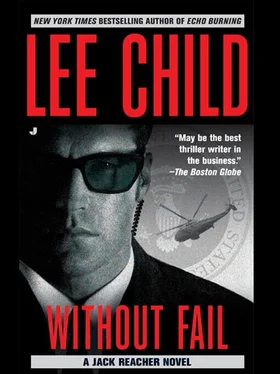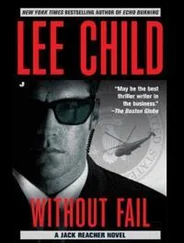Lee Child - Without Fail
Здесь есть возможность читать онлайн «Lee Child - Without Fail» весь текст электронной книги совершенно бесплатно (целиком полную версию без сокращений). В некоторых случаях можно слушать аудио, скачать через торрент в формате fb2 и присутствует краткое содержание. Жанр: Триллер, на английском языке. Описание произведения, (предисловие) а так же отзывы посетителей доступны на портале библиотеки ЛибКат.
- Название:Without Fail
- Автор:
- Жанр:
- Год:неизвестен
- ISBN:нет данных
- Рейтинг книги:3 / 5. Голосов: 1
-
Избранное:Добавить в избранное
- Отзывы:
-
Ваша оценка:
- 60
- 1
- 2
- 3
- 4
- 5
Without Fail: краткое содержание, описание и аннотация
Предлагаем к чтению аннотацию, описание, краткое содержание или предисловие (зависит от того, что написал сам автор книги «Without Fail»). Если вы не нашли необходимую информацию о книге — напишите в комментариях, мы постараемся отыскать её.
Without Fail — читать онлайн бесплатно полную книгу (весь текст) целиком
Ниже представлен текст книги, разбитый по страницам. Система сохранения места последней прочитанной страницы, позволяет с удобством читать онлайн бесплатно книгу «Without Fail», без необходимости каждый раз заново искать на чём Вы остановились. Поставьте закладку, и сможете в любой момент перейти на страницу, на которой закончили чтение.
Интервал:
Закладка:
There was a regular knob on the back of the door that operated the same latch as the push bar. It had a keyhole, but it wasn’t locked. It turned easily. Makes sense , he thought. The building was secure as a whole. They didn’t need for every floor to be isolated as well. He let the door close behind him and waited in the gloom on the stairwell for a second. Turned the knob again and reopened the door and stepped back into the brightness of the secretarial area, one pace. Twisted and looked up at the surveillance camera. It was right there above his head, set so it would pick him up sometime during his second step. He inched forward and let the door close behind him. Checked the camera again. It would be seeing him by now. And he still had more than eight feet to go before he reached Stuyvesant’s door.
“The cleaners put the message there,” the secretary said. “There’s no other possible explanation.”
Then her phone rang and she excused herself politely and answered it. Reacher and Neagley walked back through the maze of corridors and found Froelich’s office. It was quiet and dark and empty. Neagley flicked the halogen lights on and sat down at the desk. There was no other chair, so Reacher sat on the floor with his legs straight out and his back propped against the side of a file cabinet.
“Tell me about the cleaners,” he said.
Neagley drummed a rhythm on the desk with her fingers. The click of her nails alternated with little papery thumps from the pads of her fingers.
“They’re all lawyered up,” she said. “The department sent them attorneys, one each. They’re all Mirandized, too. Their human rights are fully protected. Wonderful, isn’t it? The civilian world?”
“Terrific. What did they say?”
“Nothing much. They clammed up tight. Stubborn as hell. But worried as hell, too. They’re looking at a rock and a hard place. Obviously very frightened about revealing who told them to put the paper there, and equally frightened about losing their jobs and maybe going to jail. They can’t win. It wasn’t attractive.”
“You mention Stuyvesant’s name?”
“Loud and clear. They know his name, obviously, but I’m not sure they know who he is , specifically. They’re night workers. All they see is a bunch of offices. They don’t see people. They didn’t react to his name at all. They didn’t really react to anything. Just sat there, scared to death, looking at their lawyers, saying nothing.”
“You’re slipping. People used to eat out of your hand, the way I recall it.”
She nodded. “I told you, I’m getting old. I couldn’t get a handle on them anywhere. The lawyers wouldn’t let me, really. The civilian justice system is very off-putting. I never felt so disconnected.”
Reacher said nothing. Checked his watch. “So what now?” Neagley asked.
“We wait,” he said.
The wait went slowly. Froelich came back after an hour and a half and reported that Armstrong was safely back in his own office. She had persuaded him to come with her in the car. She told him she understood that he preferred to walk, but she made the point that her team needed operational fine-tuning and there was no better time to do it than right now. She pushed it to the point where a refusal would have seemed like a prima-donna pain in the ass, and Armstrong wasn’t like that, so he climbed into the Suburban quite happily. The transfer through the tent at the Senate Offices had worked without incident.
“Now make some calls,” Reacher said. “See if anything’s happened that we need to know about.”
She checked with the D.C. cops first. There was the usual list of urban crimes and misdemeanors, but it would have been a stretch to categorize any of them as a demonstration of Armstrong’s vulnerability. She transferred to the precinct holding the crazy guy and took a long verbal report on his status. Hung up and shook her head.
“Not connected,” she said. “They know him. IQ below eighty, alcoholic, sleeps on the street, barely literate, and his prints don’t match. He’s got a record a yard long for jumping on anybody he’s ever seen in the newspapers he sleeps under. Some kind of a bipolar problem. I suggest we forget all about him.”
“OK,” Reacher said.
Then she opened up the National Crime Information Center database and looked at recent entries. They were flooding in from all over the country at a rate faster than one every second. Faster than she could read them.
“Hopeless,” she said. “We’ll have to wait until midnight.”
“Or one o’clock,” Neagley said. “It might happen on Central time, out there in Bismarck. They might shoot up his house. Or throw a rock through the window.”
So Froelich called the cops in Bismarck and asked for immediate notification of anything that could be even remotely connected to an interest in Armstrong. Then she made the same request to the North Dakota State Police and the FBI nationwide.
“Maybe it won’t happen,” she said.
Reacher looked away. You better hope it does , he thought.
Around seven o’clock in the evening the office complex began to quiet down. Most of the people visible in the corridors were drifting one way only, toward the front exit. They were wearing raincoats and carrying bags and briefcases.
“Did you check out of the hotel?” Froelich asked.
“Yes,” Reacher said.
“No,” Neagley said. “I make a terrible houseguest.”
Froelich paused a beat, a little taken aback. But Reacher wasn’t surprised. Neagley was a very solitary person. Always had been. She kept herself to herself. He didn’t know why.
“OK,” Froelich said. “But we should take some time out. Rest up and regroup later. I’ll drop you guys off and then go try to get Armstrong home safely.”
They rode together down to the garage and Froelich fired up her Suburban and drove Neagley to the hotel. Reacher walked with her as far as the bell captain’s stand and reclaimed his Atlantic City clothes. They were packed with his old shoes and his toothbrush and his razor, folded up inside a black garbage bag he had taken from a maid’s cart. It didn’t impress the bellboy. But he carried it out to the Suburban anyway and Reacher took it from him and gave him a dollar. Then he climbed back in alongside Froelich and she drove on. It was cold and dark and damp and the traffic was bad. There was congestion everywhere. Long lines of red brake lights streamed ahead of them, long lines of bright white headlights streamed toward them. They drove south across the Eleventh Street Bridge and fought through a maze of streets to Froelich’s house. She double-parked with the motor running and fiddled behind the steering wheel and took her door key off its ring. Handed it to him.
“I’ll be back in a couple of hours,” she said. “Make yourself at home.”
He took his bag and got out and watched her drive off. She made a right to loop back north over a different bridge and disappeared from sight. He crossed the sidewalk and unlocked her front door. The house was dark and warm. It had her perfume in it. He closed the door behind him and fumbled for a light switch. A low-wattage bulb came on inside a yellow shade on a lamp on a small chest of drawers. It gave a soft, muted light. He put the key down next to it and dropped his bag at the foot of the stairs and stepped into the living room. Switched on the light. Walked on into the kitchen. Looked around.
There were basement stairs behind a door. He stood still for a second with his ritual curiosity nagging at him. It was an ingrained reflex, like breathing. But was it polite to search your host’s house? Just out of habit? Of course not . But he couldn’t resist. He walked down the stairs, switching lights on as he went. The basement itself was a dark space walled with smooth old concrete. It had a furnace and a water softener in it. A washing machine and an electric dryer. Shelving units. Old suitcases. Plenty of miscellaneous junk stacked all around, but nothing of any great significance. He walked back up. Turned off the lights. Opposite the head of the stairs was an enclosed space right next to the kitchen. It was larger than a closet, smaller than a room. Maybe a pantry, originally. It had been fitted out as a tiny home office. There was a rolling chair and a desk and shelves, all of them a few years old. They looked like chain-store versions of real office furniture, with plenty of wear and tear on them. Maybe they were secondhand. There was a computer, fairly old. An inkjet printer connected to it with a fat cable. He moved back into the kitchen.
Читать дальшеИнтервал:
Закладка:
Похожие книги на «Without Fail»
Представляем Вашему вниманию похожие книги на «Without Fail» списком для выбора. Мы отобрали схожую по названию и смыслу литературу в надежде предоставить читателям больше вариантов отыскать новые, интересные, ещё непрочитанные произведения.
Обсуждение, отзывы о книге «Without Fail» и просто собственные мнения читателей. Оставьте ваши комментарии, напишите, что Вы думаете о произведении, его смысле или главных героях. Укажите что конкретно понравилось, а что нет, и почему Вы так считаете.












